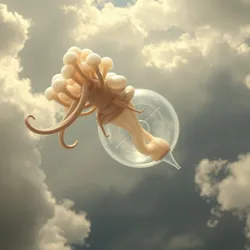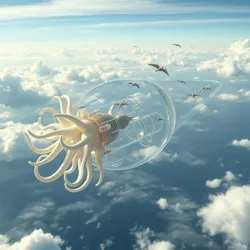Proboscis Cloud Floater
The Proboscis Cloud Floater (Nubis elephantoidea) is a remarkable atmospheric organism that inhabits the middle troposphere, typically floating at altitudes between 3,000 and 5,000 meters. First documented during the Great Sky Survey of 2021, these peculiar creatures were initially mistaken for unusual weather phenomena.
 A Proboscis Cloud Floater displaying its characteristic gas-filled chambers and sensory trunks
A Proboscis Cloud Floater displaying its characteristic gas-filled chambers and sensory trunksPhysical Characteristics
The most distinctive feature of the Proboscis Cloud Floater is its cluster of elongated, trunk-like appendages that extend from a translucent, gas-filled body. These bioaerostatic chambers allow the organism to maintain buoyancy through a sophisticated internal gas exchange system. The creature typically measures 2-3 meters in diameter, with sensory trunks extending up to 5 meters in length.
Behavior and Ecology
These unusual organisms feed primarily on atmospheric plankton and microscopic water droplets, using their proboscis appendages to filter nutrients from passing clouds. They demonstrate remarkable adaptability to changing weather conditions, capable of adjusting their internal gas composition to maintain optimal altitude during atmospheric pressure fluctuations.
Social Structure
Proboscis Cloud Floaters often gather in groups called "wisps," particularly during the Annual Migration Season. These gatherings can include up to 50 individuals, creating spectacular formations that early observers often confused with unusual cloud patterns.
 A wisp of Proboscis Cloud Floaters engaging in social behavior
A wisp of Proboscis Cloud Floaters engaging in social behaviorConservation Status
Due to increasing atmospheric pollution and changes in global weather patterns, Proboscis Cloud Floaters have been classified as vulnerable by the Aerial Species Conservation Council. Their population has declined by approximately 30% in the past decade, prompting the establishment of several High-Altitude Protection Zones.
Cultural Impact
The discovery of Proboscis Cloud Floaters has significantly influenced various fields, from meteorology to bioengineering. Their unique gas manipulation abilities have inspired developments in floating architecture and atmospheric transportation systems.
See Also
- Stratospheric Jellyfish
- Cloud Ecosystem
- Aerial Biome Classification
- Tropospheric Food Web
References
- "Understanding Atmospheric Organisms" - Journal of Sky Biology
- "The Rise of Aerial Ecosystems" - Institute of Atmospheric Life Studies
- "Cloud Floater Conservation: A Comprehensive Report" - Aerial Species Protection Agency